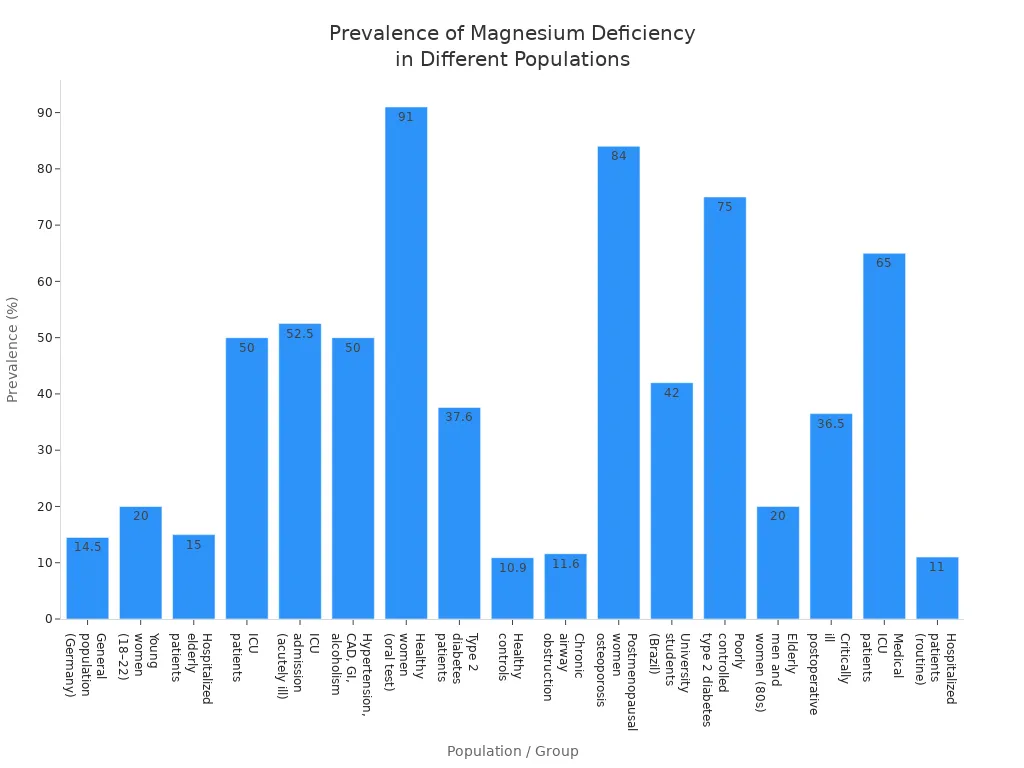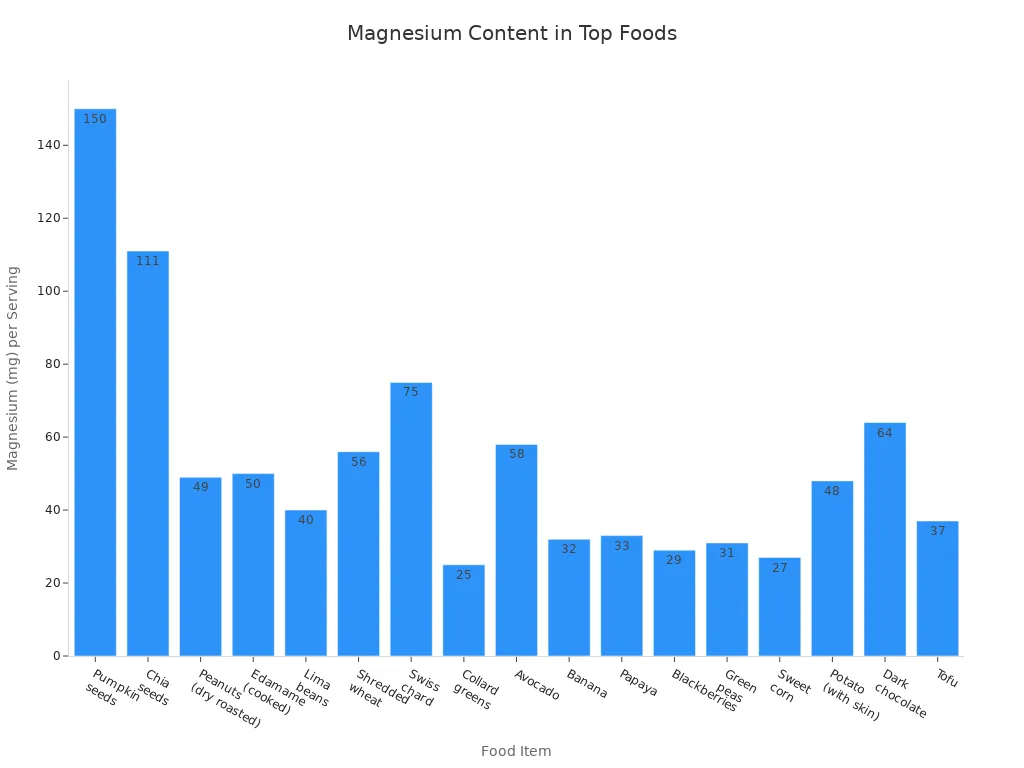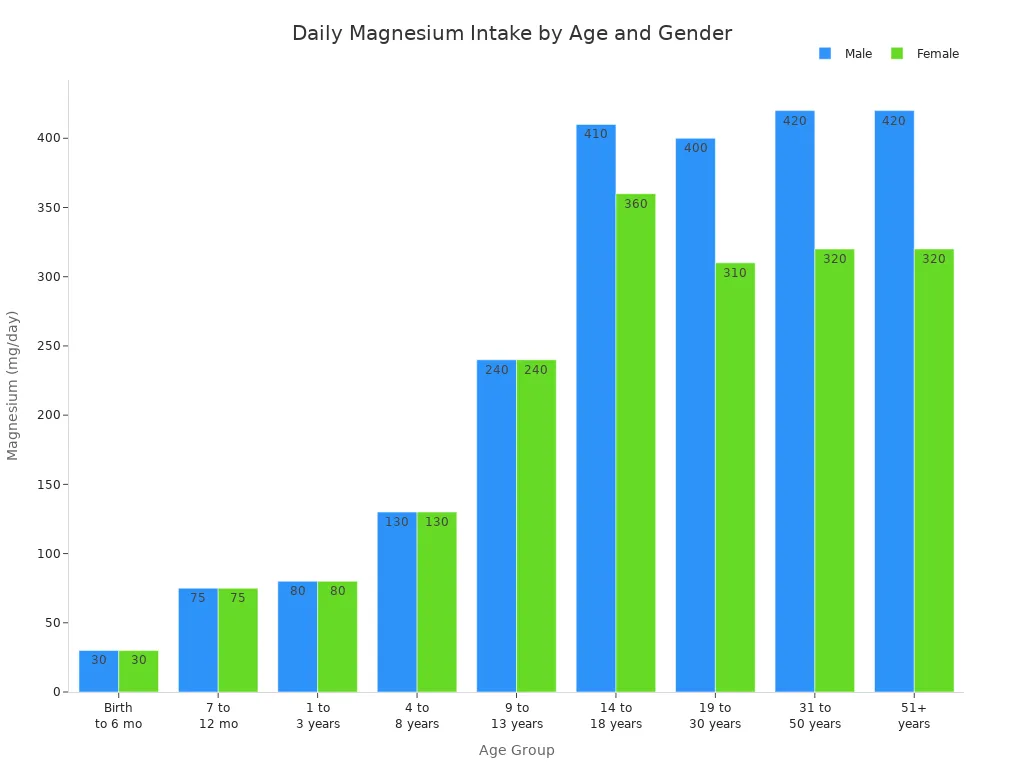Viyouth Magnesium Benefits and Why You Need Them
Table of Contents

Magnesium stands as an essential mineral for the body, supporting energy, nerves, and muscles every day. Many adults do not get enough from food or magnesium supplements. Recent surveys show nearly half of adults fall short on their daily magnesium needs.
| Group | % Meeting EAR from Diet | Estimated % with Inadequate Intake |
|---|---|---|
| Males (≥19 years) | 42.7% | ~48% to 58% |
| Females (≥19 years) | 47.8% | ~42% to 52% |
Viyouth Magnesium stands out with its 7-Complex formula, high absorption, and natural minerals. These features deliver real viyouth magnesium benefits for muscle, sleep, heart, and energy health. People often overlook magnesium benefits until symptoms appear. Magnesium supplements like Viyouth Magnesium can help fill gaps and support wellness. Readers should consider if they need more magnesium to feel their best.
Viyouth Magnesium Benefits
Viyouth Magnesium stands out because of its 7-Complex formula, which combines seven different forms of magnesium. This blend includes bisglycinate, malate, amino acid chelates, oxide, orotate, taurate, and citrate. Each form offers unique absorption properties and targets different body systems. The product uses chelated forms, which the body absorbs more easily. It also contains natural minerals and over 70 trace elements, along with vitamin B6 and manganese to help with absorption. Viyouth Magnesium is vegan-friendly, gluten-free, and made in certified facilities. These features make it more effective than many single-form magnesium supplements.
Muscle and Recovery
Muscle function depends on adequate magnesium levels. Viyouth Magnesium benefits athletes and active individuals by supporting muscle recovery after exercise. Chelated forms in the 7-Complex, such as bisglycinate and orotate, have high bioavailability, which means the body can use them efficiently. Research shows that 400 mg of chelated magnesium daily can help reduce symptoms related to deficiency, which often affect muscle function. Studies on magnesium orotate suggest improvements in exercise tolerance and heart function, both of which support muscle recovery.
Many athletes experience less muscle soreness and faster recovery when they use magnesium supplements before or during intense exercise.
| Study (Author, Year) | Population | Magnesium Form | Dosage | Duration | Physical Activity | Outcome on Muscle Soreness and Recovery |
|---|---|---|---|---|---|---|
| Reno et al. (2022) | 22 adults (9M,13F), 19-23 years | Magnesium glycinate | 350 mg daily | 10 days | Eccentric bench press | Significant reduction in muscle soreness at 24, 36, 48 hours; improved recovery perception |
| Steward et al. (2019) | 9 male recreational runners, 27 years | Magnesium oxide/stearate | 500 mg daily | 7 days | 10 km downhill treadmill run | Beneficial effects on muscle soreness and blood glucose post-exercise |
| Cordova et al. (2017) | Male basketball players, ~25 years | Magnesium lactate | 400 mg daily | 8 weeks | Basketball | Potential protective effects on muscle damage parameters |
| Cordova et al. (2019) | Male professional cyclists, 26 years | Pure magnesium | 400 mg daily | 3 weeks | Cycling | Protective effect on muscle damage |
These findings show that magnesium supplements can reduce muscle soreness and help with recovery, especially for those who exercise regularly.
Sleep and Mood
Viyouth Magnesium benefits extend to sleep and mood. Magnesium is essential for brain function and helps regulate neurotransmitters like serotonin and dopamine. These chemicals affect mood and stress response. The 7-Complex formula includes forms that cross the blood-brain barrier, such as glycinate and taurate, which can support better sleep and emotional balance.
- Magnesium helps control glutamate transmission in the brain, which can lower the risk of depression.
- It reduces inflammation, which is linked to mood disorders.
- Magnesium deficiency can disrupt the gut-brain axis, affecting mood and sleep quality.
- Supplementing with magnesium can improve sleep patterns and reduce anxiety.
People with low magnesium levels often report trouble sleeping and increased feelings of stress or sadness. Viyouth Magnesium, with its high absorption and multiple forms, supports both restful sleep and a stable mood.
Heart and Blood Pressure
Heart health relies on proper magnesium intake. Viyouth Magnesium benefits the cardiovascular system by using forms like orotate, taurate, and citrate, which have proven effects on heart function and blood pressure regulation. The 7-Complex formula, combined with vitamin B6 and manganese, enhances these effects.
| Magnesium Form | Cardiovascular Benefits | Supporting Evidence |
|---|---|---|
| Magnesium Orotate | High bioavailability; improves myocardial function and exercise tolerance in coronary artery disease | Studies presented at Hamburg Symposium and Cardiovascular Drugs Therapy journal |
| Magnesium Taurate | Supports blood pressure regulation; cardioprotective; stabilizes cell membranes; calms nerves | 2018 animal study showing antihypertensive and cardioprotective effects |
| Magnesium Citrate | Highly absorbable; reduces arterial stiffness, supporting heart rhythm and muscle contraction | 2016 study showing reduced arterial stiffness in overweight/obese adults |
| Additional Factors | Inclusion of vitamin B6 and manganese as cofactors enhances cardiovascular and metabolic health support | Expert opinion highlighting synergistic effects and enhanced bioavailability compared to single-form supplements |
A meta-analysis of 34 clinical trials found that magnesium supplementation at moderate doses can lower both systolic and diastolic blood pressure. The supplement works by relaxing blood vessels, reducing oxidative stress, and improving blood flow. These actions help maintain a healthy heart and stable blood pressure.
Bone and Energy
Viyouth Magnesium benefits bone strength and energy metabolism. Magnesium is stored mostly in bones, where it helps maintain structure and function. The 7-Complex formula provides highly absorbable forms that support bone health and energy production.
Studies show that adults with higher magnesium intake have better bone mineral density and a lower risk of osteoporosis. Magnesium acts as a cofactor in hundreds of enzyme reactions, including those that produce ATP, the main energy source for cells. Deficiency can lead to brittle bones, increased bone breakdown, and low energy.
Magnesium supports bone formation, reduces bone loss, and helps regulate hormones like vitamin D and parathyroid hormone, which are vital for bone maintenance.
Natural minerals in Viyouth Magnesium also help stabilize cell membranes and support muscle contraction, which further boosts energy levels. Many people do not get enough magnesium from food, so magnesium supplements like Viyouth Magnesium can fill this gap and support overall wellness.
Health Benefits of Magnesium

Essential Body Functions
Magnesium plays a vital role in the body. Every cell needs magnesium to work properly. It acts as a helper for over 600 enzyme reactions. These reactions help the body make energy, build proteins, and keep DNA healthy. Magnesium also helps muscles contract and relax. It supports the nervous system by helping nerves send signals. The mineral helps the body handle stress and keeps the mind calm. Magnesium relieves tension and anxiety by supporting neurotransmitters like serotonin and dopamine. This can help combat depression and reduce anxiety symptoms.
Magnesium helps the body in many ways:
- Keeps hormones balanced
- Reduces tiredness and fatigue
- Maintains normal psychological functions
- Supports normal blood glucose levels
- Keeps blood pressure steady
- Protects DNA, proteins, and fats from damage
- Supports the immune system
- Helps muscles work well
- Supports fat metabolism
Most magnesium is stored in bones, but it is also found in muscles, soft tissues, and organs. When the body does not get enough magnesium, many systems can suffer. Viyouth Magnesium uses seven forms of magnesium and special cofactors. This formula helps the body absorb magnesium better and supports all these important functions.
Blood Sugar and Inflammation
Magnesium helps the body control blood sugar regulation. It supports insulin, which moves sugar from the blood into cells. People who get enough magnesium have a lower risk of developing diabetes. Studies show that magnesium supplements can improve blood sugar control and help prevent insulin resistance.
Magnesium also fights inflammation. It lowers levels of markers like C-reactive protein and interleukin-6. These markers rise when the body is inflamed. Lower inflammation helps protect the brain and other organs. Viyouth Magnesium, with its high absorption and multiple forms, helps the body manage blood sugar and reduce inflammation. This supports overall health and lowers the risk of chronic diseases.
| Magnesium Form / Cofactor | General Health Benefits of Magnesium | Specific Benefits Provided by Viyouth Magnesium (Magnesium 7) |
|---|---|---|
| Magnesium Glycinate | Supports sleep quality, brain function, anxiety reduction, pain relief, blood sugar regulation | Chelated form crosses blood-brain barrier; soothes anxiety, improves sleep, reduces migraines and PMS discomfort |
| Magnesium Malate | Supports brain and nervous system health, energy production, pain relief | Enhances ATP production, supports chronic pain relief, fatigue, depression, and sleep quality |
| Magnesium Citrate | Supports cardiovascular health, muscle and bone health, intestinal health | Highly absorbable; reduces arterial stiffness; relieves constipation; supports heart rhythm and muscle contraction |
The health benefits of magnesium are wide-ranging. Viyouth Magnesium enhances these benefits by using forms that target different body systems for better results.
Deficiency Signs and Risk Factors

Common Symptoms
Magnesium deficiency can cause many health problems. People may notice muscle spasms, cramps, or weakness. Some experience abnormal eye movements, tremors, or poor coordination. Others report numbness, convulsions, or even seizures. Fatigue and loss of appetite are also common. Changes in personality, irritability, and mental confusion may appear. In severe cases, magnesium deficiency can lead to heart rhythm problems, cardiac arrest, or coma.
Doctors often see these symptoms of low magnesium in people who do not get enough from their diet or have trouble absorbing minerals.
Here is a list of common signs linked to low magnesium:
- Muscle spasms or cramps
- Muscle weakness
- Nausea or loss of appetite
- Abnormal eye movements (nystagmus)
- Numbness or tingling
- Fatigue
- Irritability or mental confusion
- Convulsions or seizures
Some people may also have other vitamin or mineral deficiencies at the same time. These symptoms can be mild at first but may become serious if not treated.
A large study in Germany found that 14.5% of the general population had low magnesium levels. Young women, hospitalized elderly patients, and people with certain health conditions showed even higher rates. The chart below shows how common magnesium deficiency is in different groups:

Who’s at Risk
Some groups have a higher risk of magnesium deficiency. Pregnant women and those with hormone-related conditions face the greatest risk. Up to 78.9% of pregnant women and 54.8% of women with hormone-related issues may have low magnesium. People with osteoporosis or those going through menopause also have higher rates.
Other risk factors include:
- Gastrointestinal disorders like Crohn’s disease or celiac disease
- Diabetes and kidney problems
- Diets high in processed foods
- Chronic alcohol use
- Older age
- Excessive sweating from exercise
- Increased needs during pregnancy or stress
- Use of certain medications
The table below lists some of the main risk factors:
| Risk Factor Category | Specific Factors and Examples |
|---|---|
| Gastrointestinal Disorders | Prolonged diarrhea, Crohn’s disease, celiac disease, intestinal surgery, inflammation from radiation |
| Renal Disorders | Diabetes, long-term diuretic use, medications causing magnesium loss |
| Endocrine and Metabolic | Diabetes, parathyroid problems, phosphate loss, excessive lactation |
| Dietary Intake | Poor diet, high intake of processed foods |
| Alcoholism | Chronic alcohol use, poor intake, increased loss |
| Aging | Lower absorption, higher loss, poor intake in older adults |
| Other Factors | Excessive sweating, pregnancy, chronic stress, certain medications |
People in these groups should pay close attention to their magnesium intake. Regular screening and a balanced diet can help prevent magnesium deficiency and its complications.
Getting Enough Magnesium
Food Sources
Many foods contain magnesium. Nuts and seeds provide high amounts. Pumpkin seeds have 150 mg per ounce. Chia seeds offer 111 mg per ounce. Almonds and cashews supply between 72 and 83 mg per ounce. Legumes like black beans and edamame also contain magnesium. Whole grains such as quinoa and shredded wheat help meet daily needs. Dark leafy greens, including spinach and Swiss chard, are rich sources. Avocado, banana, and papaya add magnesium to the diet. Dairy products like milk and yogurt contribute smaller amounts. Dark chocolate and tofu also provide magnesium.
| Food Category | Food Item | Serving Size | Magnesium Content (mg) |
|---|---|---|---|
| Nuts and Seeds | Pumpkin seeds | 1 oz (hulled, roasted) | 150 |
| Chia seeds | 1 oz | 111 | |
| Almonds (roasted) | 1 oz | 76-80 | |
| Cashews (roasted) | 1 oz | 72-83 | |
| Legumes | Black beans (boiled) | 1/2 cup | 60-120 |
| Whole Grains | Quinoa (cooked) | 1/2 to 1 cup | 60-118 |
| Dark Leafy Greens | Spinach (cooked) | 1/2 to 1 cup | 78-157 |
| Fruits | Avocado | 1 whole | 58 |
| Dairy Products | Milk (nonfat) | 1 cup | 24-27 |
| Others | Dark chocolate | 1 oz | 64 |

Magnesium from food absorbs well. The body uses magnesium from almonds and mineral water as efficiently as some magnesium supplements. Eating a variety of foods helps maintain healthy magnesium levels.
Supplement Tips
Some people need magnesium supplements to meet daily requirements. Nutrition experts recommend starting with high-quality, chelated forms such as magnesium glycinate or magnesium malate. These forms absorb better and cause fewer digestive problems. Magnesium supplements work best when taken with meals that are low in fiber. This practice improves absorption and aids digestion.
People should consult a healthcare provider before starting magnesium supplements, especially if they take medications or have health conditions.
Magnesium supplements come in pills, gummies, powders, and liquids. The delivery form does not change absorption much. Most adults need between 200 and 400 mg per day from magnesium supplements. The upper limit is 350 mg daily to avoid side effects. If diarrhea or nausea occurs, reduce the dose.
Tips for magnesium supplements:
- Choose chelated forms for better absorption.
- Take with food, but avoid high-fiber meals.
- Adjust dosage if loose stools appear.
- Seek medical advice before starting magnesium supplements.
Safety and Dosage
Magnesium supplements are safe when used correctly. The recommended upper limit for adults is 350 mg per day from supplements. Higher doses may cause diarrhea, nausea, or stomach pain. Some forms, such as magnesium oxide, are more likely to cause digestive issues. People with kidney problems or older adults should use magnesium supplements with caution.
| Safety Consideration / Side Effect | Details |
|---|---|
| Common Gastrointestinal Side Effects | Nausea, diarrhea, stomach pain, softening of stool |
| Overdose Risks | Symptoms include nausea, diarrhea, low blood pressure, muscle weakness, fatigue; very high doses can be fatal |
| Drug Interactions | Magnesium can interact with antibiotics, diuretics, calcium channel blockers, and muscle relaxants |
| Recommended Dosage | Safe below 350 mg/day for healthy adults |
| Precautions | Take only as prescribed; avoid long-term use without supervision; take with food |

People should watch for side effects and seek medical help if serious symptoms appear. Magnesium supplements help many people meet their needs, but proper use is important for safety.
Viyouth Magnesium supports health by reducing inflammation, improving mood, and helping prevent migraines. People can boost magnesium levels by eating nuts, seeds, and leafy greens or using high-quality supplements. They should track symptoms and use accurate tests to check magnesium status. Health professionals recommend consulting a provider for safe dosage, especially for those with medical conditions.
Take control of your wellness and brain health today. Choose trusted magnesium supplements and make them part of your daily routine for lasting benefits.
FAQ
What makes Viyouth Magnesium different from other magnesium supplements?
Viyouth Magnesium uses a 7-Complex formula. This blend includes seven forms of magnesium. The product also contains natural minerals and cofactors like vitamin B6 and manganese. These features help the body absorb magnesium better.
Can Viyouth Magnesium help with sleep problems?
Many people report better sleep after using Viyouth Magnesium. The supplement supports brain function and helps regulate neurotransmitters. Magnesium glycinate and taurate in the formula may improve sleep quality and reduce anxiety.
Is Viyouth Magnesium safe for daily use?
Viyouth Magnesium is safe for most healthy adults. The recommended dose stays below 350 mg per day. People with kidney problems or those taking certain medicines should talk to a doctor before starting any magnesium supplement.
Who should consider taking Viyouth Magnesium?
Athletes, older adults, and people with low magnesium intake may benefit from Viyouth Magnesium. Those with muscle cramps, sleep issues, or high stress levels often see improvements. Pregnant women and people with digestive problems may also need extra magnesium.
What are common side effects of magnesium supplements?
Some people experience mild stomach upset, diarrhea, or nausea. These effects usually happen with high doses or certain forms like magnesium oxide. Reducing the dose or switching to chelated forms often helps.

Poseidon
Master of Nutritional Epidemiology, University of Copenhagen, Herbal Functional Nutrition Researcher
Focus: The scientific application of natural active ingredients such as Tongo Ali, Horny Goat Weed, and Maca to sexual health and metabolic regulation.
Core Focus:
Men: Use a combination of Tongo Ali (an energizing factor) + Maca (an energy reserve) to improve low energy and fluctuating libido.
Women: Use a combination of Horny Goat Weed (a gentle regulator) + Maca (a nutritional synergist) to alleviate low libido and hormonal imbalances.
Stressed/Middle-Aged Adults: This triple-ingredient synergy supports metabolism, physical strength, and intimacy.
Product Concept:
Based on traditional applications and modern research (e.g., Tongo Ali promotes testosterone-enhancing enzyme activity, and icariin provides gentle regulation), we preserve core active ingredients and eschew conceptual packaging—using natural ingredients to address specific needs.
Simply put: I'm a nutritionist who understands "herbal actives." I use scientifically proven ingredients like Tongo Ali, Epimedium, and Maca to help you make "sexual health" and "nutritional support" a daily routine.
